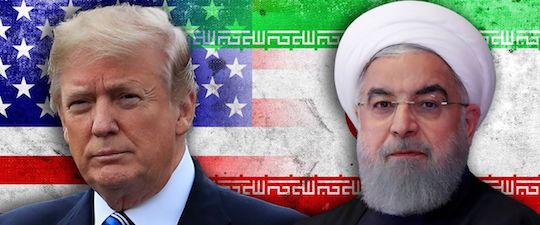Bucking world opinion, Trump withdraws from Iran nuclear deal, imposes ‘highest level of economic sanctions’
“This was a horrible one-sided deal that should have never, ever been made,” Trump said in his announcement from the White House. “It didn’t bring calm, it didn’t bring peace, and it never will.”
By Sean Savage
(JNS) President Donald Trump announced his withdrawal from the 2015 Iranian nuclear deal on Tuesday, while announcing stiff new economic sanctions on the Islamic Republic.
“This was a horrible one-sided deal that should have never, ever been made,” Trump said in his announcement from the White House. “It didn’t bring calm, it didn’t bring peace, and it never will.”
He also said that he will impose new tough sanctions on Iran, while warning other countries from doing business with Tehran.
“We will be instituting the highest level of economic sanction,” warned Trump. “Any nation that helps Iran in its quest for nuclear weapons could also be strongly sanctioned by the United States.”
As such, the new sanctions instituted by Trump will re-impose oil sanctions and secondary sanctions against the Central Bank of Iran, while also instructing the Treasury Department to develop additional sanctions over the course of the next few weeks. The financial sanctions will give European companies between 90 and 180 days to wind down their business in Iran, while the oil sanctions will require European and Asian countries to reduce their imports from the Islamic Republic.
Trump continued his heavy criticism of the accord, calling it an “embarrassment” and “disastrous.”
“At the point when the U.S. had maximum leverage, this disastrous deal gave this regime—and it’s a regime of great terror—many billions of dollars, some of it in actually cash, a great embarrassment to me as a citizen.”
Netanyahu supports ‘bold decision’ on Iran
Notably, the president cited Israeli Prime Minister Benjamin Netanyahu presentation’s last week that detailed new Israeli intelligence outlining Iran’s covert attempts at developing a nuclear arsenal.
“Last week, Israel published intelligence documents—long concealed by Iran—conclusively showing the Iranian regime’s history of pursuing nuclear weapons,” Trump said, while warning that there would soon be a “nuclear-arms race in the Middle East” if he let the deal stand.
Trump also echoed Netanyahu’s rhetoric from the presentation, saying that Iran has “lied” about its past nuclear intentions, and therefore, the 2015 agreement was built on a false premise.
“The so-called Iran deal was supposed to protect the United States and our allies from the lunacy of an Iranian nuclear bomb, a weapon that will only endanger the survival of the Iranian regime. In fact, the deal allowed Iran to continue enriching uranium and over time reach the brink of a nuclear blackout,” stated Trump. “Today, we have definitive proof that this Iranian promise was a lie.”
In his own statement following Trump, Netanyahu said Israel “fully supports” Trump’s “bold decision” on Iran.
“Israel has opposed the nuclear deal from the start because we said that rather than blocking Iran’s path to a bomb, the deal actually paved Iran’s path to an entire arsenal of nuclear bombs, and this within a few years’ time,” he said.
From his campaign as president until now, Trump has long been a strong opponent of the agreement forged under his predecessor President Barack Obama, yet has held out the option of renegotiating it. On Jan. 12, Trump outlined his intentions to “fix the terrible flaws” of the Iran nuclear deal, giving U.S. and European negotiators a 120-day timetable to implement the changes, which include allowing inspections on military sites, an end to sunset clauses and addressing Iran’s testing of ballistic missiles.
Nevertheless, American and European negotiators have been unable to make the changes to the deal, while the other key signatories—Iran, Russia and China—are opposed to any alterations. European and American diplomats had been deadlocked over the so-called “sunset provisions” of the deal, which would allow the Iranians to begin producing nuclear fuel for civilians use after the deal expires in 2030, the New York Times reported.
In recent weeks, Trump has been visited by Macron and German Chancellor Angela Merkel, who both lobbied the U.S. leader to remain in the deal. Shortly after his announcement, Macron said he regrets the decision by Trump.
“France, Germany and the United Kingdom regret the U.S. decision to get out of the Iranian nuclear deal,” Macron tweeted. “The international regime against nuclear proliferation is at stake.”






